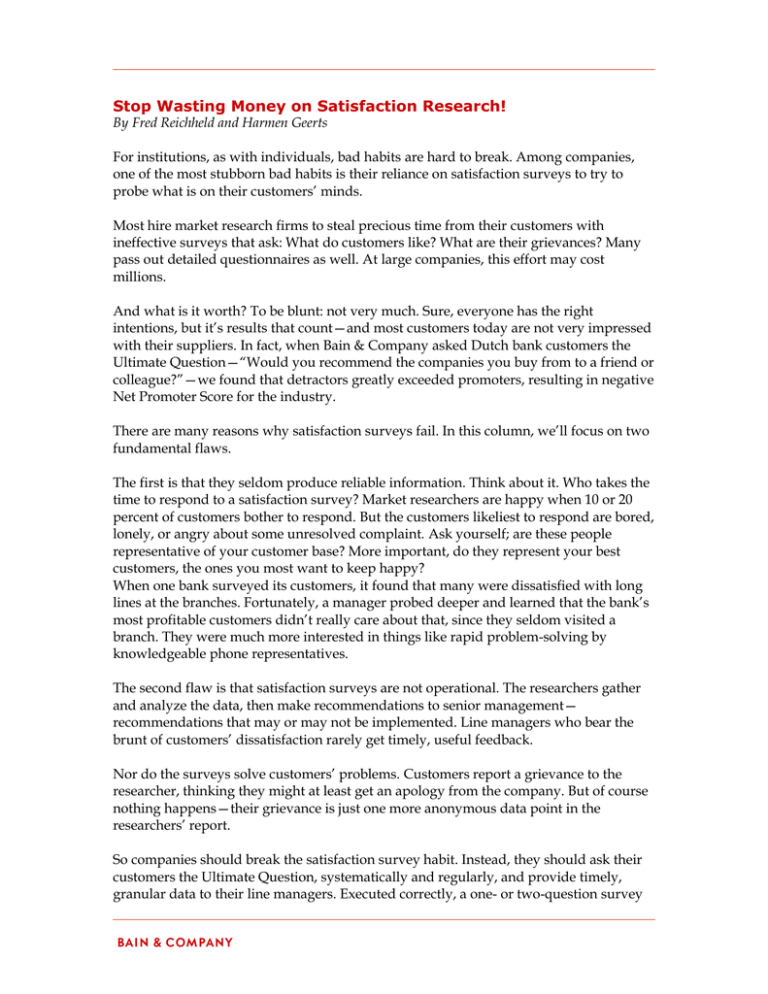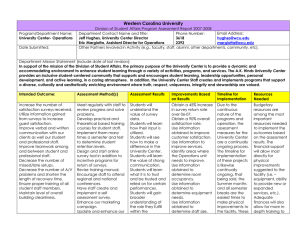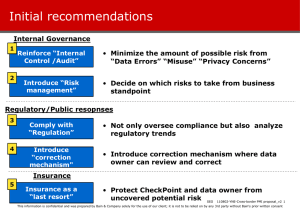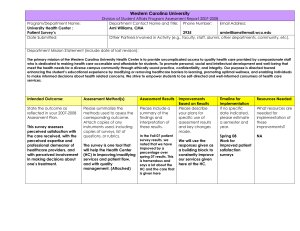Stop Wasting Money on Satisfaction Research!
advertisement

Stop Wasting Money on Satisfaction Research! By Fred Reichheld and Harmen Geerts For institutions, as with individuals, bad habits are hard to break. Among companies, one of the most stubborn bad habits is their reliance on satisfaction surveys to try to probe what is on their customers’ minds. Most hire market research firms to steal precious time from their customers with ineffective surveys that ask: What do customers like? What are their grievances? Many pass out detailed questionnaires as well. At large companies, this effort may cost millions. And what is it worth? To be blunt: not very much. Sure, everyone has the right intentions, but it’s results that count—and most customers today are not very impressed with their suppliers. In fact, when Bain & Company asked Dutch bank customers the Ultimate Question—“Would you recommend the companies you buy from to a friend or colleague?”—we found that detractors greatly exceeded promoters, resulting in negative Net Promoter Score for the industry. There are many reasons why satisfaction surveys fail. In this column, we’ll focus on two fundamental flaws. The first is that they seldom produce reliable information. Think about it. Who takes the time to respond to a satisfaction survey? Market researchers are happy when 10 or 20 percent of customers bother to respond. But the customers likeliest to respond are bored, lonely, or angry about some unresolved complaint. Ask yourself; are these people representative of your customer base? More important, do they represent your best customers, the ones you most want to keep happy? When one bank surveyed its customers, it found that many were dissatisfied with long lines at the branches. Fortunately, a manager probed deeper and learned that the bank’s most profitable customers didn’t really care about that, since they seldom visited a branch. They were much more interested in things like rapid problem-solving by knowledgeable phone representatives. The second flaw is that satisfaction surveys are not operational. The researchers gather and analyze the data, then make recommendations to senior management— recommendations that may or may not be implemented. Line managers who bear the brunt of customers’ dissatisfaction rarely get timely, useful feedback. Nor do the surveys solve customers’ problems. Customers report a grievance to the researcher, thinking they might at least get an apology from the company. But of course nothing happens—their grievance is just one more anonymous data point in the researchers’ report. So companies should break the satisfaction survey habit. Instead, they should ask their customers the Ultimate Question, systematically and regularly, and provide timely, granular data to their line managers. Executed correctly, a one- or two-question survey that directly asks customers their willingness to recommend will draw responses from 80 or 90 percent—and most will welcome a follow-up call from the front-line managers who can actually solve their problem. Fred Reichheld, a director emeritus at Bain & Company and a Bain Fellow, is the author of The Ultimate Question: Driving Good Profits and True Growth (Harvard Business School Press, 2006). Harmen Geerts is a partner in Bain’s Amsterdam office where he is a leader of the firm’s European Customer Strategy and Marketing practice.



